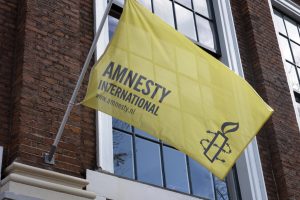Ultra-royalist figures in Thailand claim that they have secured more than a million signatures expressing support for a plan to expel the international human rights organization Amnesty International from the country.
The announcement was made on Tuesday by Seksakol Atthawong, a vice minister attached to the office of Prime Minister Prayut Chan-o-cha, who accuses Amnesty’s Thai chapter of supporting a pro-democracy movement that is calling for fundamental reforms, including to the once untouchable institution of the Thai monarchy,
“NGOs that are supporting the three-hoof mob to destroy the country’s stability and abolish the royal institution are extremely dangerous,” Seksakol told reporters, according to an article in the Thai Enquirer.
The “three-hoof mob” is a reference to the three-fingered salute used by the student-led pro-democracy movement that emerged in 2020, which is calling for Prayut’s resignation, the drafting of a genuinely democratic constitution, and curbs to the powers of the Thai monarchy.
A former Red Shirt who earned the nickname “Rambo Isaan” due to his once vocal allegiance to ousted Prime Minister Thaksin Shinawatra, Seksakol has since thrown his lot in with Thailand’s ruling establishment, becoming one of its most outspoken boosters. He first called for the expulsion of the Thai chapter of Amnesty International in November, after it criticized the government’s treatment of detained members of the pro-democracy protest movement, and called for an end to violent police crackdowns on demonstrations.
“Amnesty International is an illicit organization that must be held accountable for its actions, and must be prosecuted to the fullest,” Seksakol added this week. “We should not give in to organizations that undermine national security.”
Members of the Seksakol’s royalist network have since held a series of public rallies in order to gather signatures for their petition against Amnesty. One reported by the Bangkok Post in November took place in front of the Silom Complex in Bangkok, featuring a “lion dance troupe performance” and banners bearing the message “Amnesty International GET OUT of Thailand.”
Amnesty International Thailand, which has an all Thai staff and leadership, this week expressed skepticism about the petition. “At this point in time, Amnesty International is currently conducting an internal investigation regarding this matter,” Amnesty Thailand representative Naowarat Suasa-ard told the news site Coconuts Bangkok. “Anybody can get a million signatures at any point in time.”
Seksakol’s gambit is typical of Thai ultra-royalist fringe politics. But as his position in the prime minister’s office attests, the fringe has migrated gradually to the center and the top of the Thai governing establishment since the military coup led by Prayut 2014. Facing a legitimacy deficit, Prayut’s current military-backed administration (direct military rule technically ended with the holding of a flawed election in 2019) has relied heavily on the blunt force of Thailand’s controversial lese majeste law, which outlaws any critical comment about the king or the monarchy, to silence critics and quash protests.
This has helped produce a feverish and paranoid political atmosphere in which no accusation of anti-monarchy bias, however unjust or outlandish, can afford to be ignored by the authorities, lest they also attract accusations of insufficient zeal in the cause of safeguarding king and country.
This is perhaps why the Royal Thai Police in November announced that they were looking into Seksakol’s far-fetched claim that Amnesty was undermining national security and the monarchy. Similarly, many of the 154 lese majeste cases that have been filed against pro-democracy protesters have been the result of complaints brought by ultra-royalist activists.
It will probably come as no surprise that Seksakol has also been the driving force behind draft legislation designed to rein in Thailand’s large non-government sector. Under the Draft Act on the Operations of Not-for-Profit Organizations, which was approved by Prayut’s cabinet in February of last year, all Thai civil society organizations would be required to register with the Interior Ministry, declare the sources of their annual operational funds, and disclose audited financial reports. The law would also give authorities broad discretion to determine which sorts of activities could be legitimately carried out using foreign funding.
In a joint letter issued last June, a group of 41 Thai and international rights groups said that if passed, the law would “pose serious threats to the functioning of Thai civil society as well as have a deeply damaging impact on both donors and international non-governmental organizations (NGOs) working to address human trafficking and labor rights in Thailand.”
The campaign against Amnesty International Thailand recalls the attacks on the rights group by Prime Minister Narendra Modi’s government in India, which eventually forced it to halt its operations in September 2020. It is also a worrying sign of the reactionary inclinations of Thailand’s current ruling elite, heralding an increasingly inhospitable future for anyone critical of the country’s power elite.

































